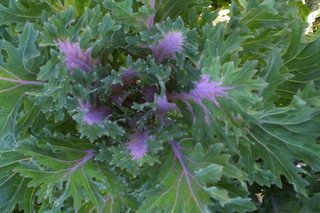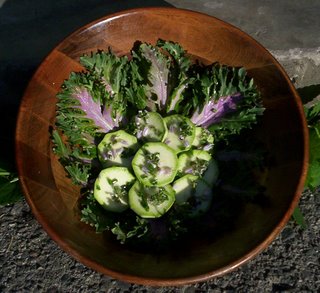
I am not one of those gardeners that carefully isolates heirloom varieties to protect their special genetic traits. Quite the contrary. I embrace random genetic exchange of the natural kind. When the birds and the bees move genetic material around via the pollen that plants provide for that purpose, I celebrate. And sometimes the plants celebrate too.

This lovely kale is a random cross between Red Russian Kale and Ornamental Kale. I have two plants growing right now – and I am so impressed that I started more seedlings. Not only is it beautiful, it is tasty, tender, and mild. Mild enough to enjoy raw in salads. The plants are fairly resistant to cabbage moths. No entirely, but not getting pounded the way some of my other brassicas are. They are also fairly resistant to aphids. The more colorful one of the two plants a little less so than the other. But the more colorful one is also more robust. It is about 3 feet high with multiple open heads. And it is so lovely passersby will distract me from the tasks at hand to find out what the heck it is and where they can get some . . .

I do have a very few seeds, which I would be willing to share with someone who is actively breeding kale. (I anticipate having plenty of seed to share after these plants flower and set seed – either this fall or mid summer next year.) If you are working on breeding kale please send me an e-mail with a link to your web site, and I will be happy to share a few seeds. Everyone else will have to be patient – but, you can always encourage surprises in your own garden . . .
And I will definitely have free seeds of Red Russian Kale available this fall. I saved seeds from plants that were aphid resistant. And I may save some more from the plant that is showing no signs of dieing after flowering and setting seed. Stay tuned – I will post a notice here when the weather cools off – shipping seed in the heat of summer can have a bad effect on their viability.
Here is some more info on the Red Russian Kale:
http://harvestsgardeningsecrets.blogspot.com/2006/02/kindly-kale.html
Bok Choi is supposed to take 2 years to set seed, but I started some early, set it out and its set a heavy crop of seed the same year.
ReplyDeleteHello, thanks for stoping by and posting . . . You wouldn't necessarily want to save seed from a plant that went to seed to soon, as its offspring are likely to do the same thing. I am not certain if this kale will bloom this fall of if it will wait till spring. Plants are triggered to flower by day length, tempreture, and their own maturity. So we shall see . . .
ReplyDeleteI hope you got a good crop from your bok choy before it set seed . . .
Harvest
Hello Harvest!
ReplyDeleteI am writing a story and a white, sea kale plant is my protagonist. I would like to incorporate a sweet little thread of a love story and was wondering if there is any other kind of plant that can be cross bred with kale. This wont be elicit, but I want it to be a feasible match. I would appreciate your thoughts.
Thanks so much. -Melissa
Hi Melissa,
ReplyDeleteSea Kale and garden kale are two different plants. I have only tried to grow sea kale - and the seeds didn't sprout for me. The sea kale's seeds are huge - like a filburt - and the kale seeds are smaller than a mustard seed. They are supposed to be related - but I don't think they are that close. I have one strange plant in my yard this year - a cross between a red russian kale and either a kholrabi or a turnip . . .